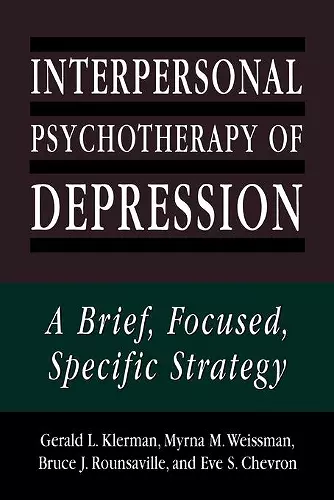Interpersonal Psychotherapy of Depression
A Brief, Focused, Specific Strategy
Gerald L Klerman author Myrna M Weissman author
Format:Paperback
Publisher:Jason Aronson Publishers
Published:1st Oct '94
Currently unavailable, and unfortunately no date known when it will be back

Reflecting the new and exciting trends in psychotherapy as well as responsive to the current emphasis on efficient, substantial therapeutic results, this book presents a model of interpersonal, short_term psychotherapy for clinically depressed patients. Gerald L. Klerman, whose research on depression has made him world renowned, and Myrna M. Weissman, who has written, with Eugene Paykel, an important book on women and depression, have worked with their colleagues to present the empirical basis for their new treatment method. This theory builds on the heritage of Harry Stack Sullivan and John Bowlby and their focus on interpersonal issues and attachment on depression. Research shows that four categories of interpersonal difficulties predominate: grief, interpersonal disputes, role transitions. and interpersonal deficits. In this approach, the therapist focuses on the patient's primary problems and evaluates the need for medication in addition to interpersonal therapy. Acknowledging that these four areas are never mutually exclusive, the authors present a clear treatment strategy for each, augmenting their presentation with a discussion of common obstacles that arise during treatment. As an overview, the book compares interpersonal psychotherapy with other psychotherapies for depression. Summaries of research documenting the efficacy of interpersonal psychotherapy are given.The authors outline the theoretical basis for an interpersonal approach, and apply it to depression. The following sections detail how to conduct interpersonal psychotherapy, supplying case vignettes to illustrate particular problems. Finally, the authors explore combining interpersonal psychotherapy with pharmacotherapy.
This book clearly sets forth the theoretical assumptions and operating principles of interpersonal psychotherapy for depression. It provides excellent illustrative case material with important collateral information, such as reviews of outcome studies and of current pharmacological treatments. A history of the interpersonal approach, and discussion of the relationships between this approach and those of 'competing' schools, add to the book's general value. The material is skillfully presented, concise, and readable. The book is a significant contribution to clinical research and practice. Readers will find it satisfying in a number of ways: as an introduction to short-term, structured psychotherapy for depression, and as a companion to texts delineating other short-term approaches, such as those of the cognitive or behavioral schools. -- Aaron T. Beck M.D., professor of psychiatry, University of Pennsylvania School of Medicine
The authors—pioneers in the development of a brief, focused, specific strategy of psychotherapy for the treatment of depression—have described their treatment with the precision and clarity that allow others to replicate their methods and evaluate their results. This book marks a major step in the transformation of psychotherapy from a field of competing traditions to a science in which hypotheses can be tested and accepted or rejected. For the first time we will be able to stop arguing about treasured beliefs and start building new treatments based upon the proven results of older ones. -- Robert Michels, M.D., The New York Hospital-Cornell Medical Center
ISBN: 9781568213507
Dimensions: 232mm x 154mm x 20mm
Weight: 404g
272 pages